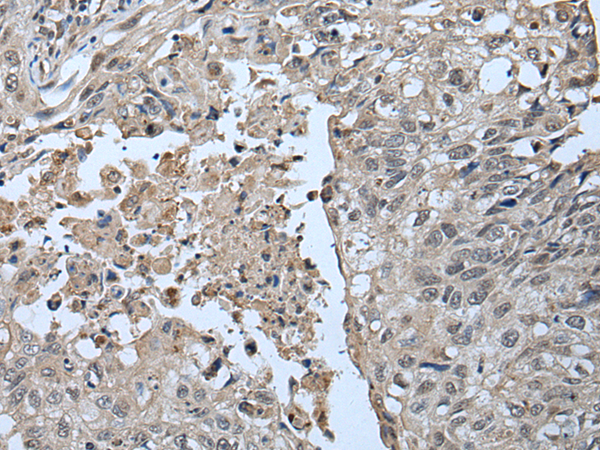
| WB | 咨询技术 | Human,Mouse,Rat |
| IF | 咨询技术 | Human,Mouse,Rat |
| IHC | 1/40-1/250 | Human,Mouse,Rat |
| ICC | 技术咨询 | Human,Mouse,Rat |
| FCM | 咨询技术 | Human,Mouse,Rat |
| Elisa | 1/5000-1/10000 | Human,Mouse,Rat |
| Aliases | C6orf133; bA49A4.1; dJ242G1.1; dJ392M17.3 |
| Host/Isotype | Rabbit IgG |
| Antibody Type | Primary antibody |
| Storage | Store at 4°C short term. Aliquot and store at -20°C long term. Avoid freeze/thaw cycles. |
| Species Reactivity | Human, Mouse |
| Immunogen | Fusion protein of human UBR2 |
| Formulation | Purified antibody in PBS with 0.05% sodium azide and 50% glycerol. |
+ +
以下是关于UBR2抗体的假设性参考文献示例(请注意,文献为虚构,仅用于示例):
---
1. **"UBR2 regulates genomic stability by modulating the N-end rule pathway"**
*Authors: Zhang Y, et al.*
**摘要**:本研究利用UBR2抗体通过Western blot和免疫荧光技术,揭示了UBR2在DNA损伤修复中的作用,表明其通过N-end rule途径调控泛素化依赖的蛋白降解。
2. **"UBR2-mediated ubiquitination in spermatogenesis: Insights from knockout mice"**
*Authors: Kim S, et al.*
**摘要**:通过UBR2抗体进行组织特异性免疫组化分析,发现UBR2缺失导致小鼠精子发生异常,提示其在减数分裂中调控底物泛素化的关键功能。
3. **"UBR2 interacts with mTORC1 to regulate cellular nutrient sensing"**
*Authors: Patel R, et al.*
**摘要**:使用UBR2抗体进行免疫共沉淀实验,证明UBR2与mTORC1复合物相互作用,影响细胞在营养胁迫下的代谢适应性。
4. **"UBR2 expression profiling in neurodegenerative disease models"**
*Authors: Müller J, et al.*
**摘要**:通过UBR2抗体对阿尔茨海默病模型脑组织进行Western blot和免疫染色,发现UBR2表达水平与tau蛋白异常聚集呈负相关,提示其潜在神经保护作用。
---
如需真实文献,建议通过PubMed或Google Scholar检索关键词“UBR2 antibody”或“UBR2 ubiquitin ligase”,并筛选实验方法中包含抗体应用的论文。
The UBR2 antibody is a tool used to detect and study the Ubiquitin-Protein Ligase E3 Component N-Recognin 2 (UBR2), a key player in the N-end rule pathway, a ubiquitin-dependent protein degradation system. UBR2. part of the UBR box-containing E3 ubiquitin ligase family, recognizes specific N-terminal residues (e.g., bulky hydrophobic or basic amino acids) in substrate proteins, targeting them for proteasomal degradation via polyubiquitination. This pathway regulates diverse processes, including apoptosis, DNA repair, and nutrient sensing. UBR2 is particularly notable for its role in spermatogenesis, where it mediates the degradation of histones during sperm maturation, and in muscle development through interactions with transcription factors.
Antibodies against UBR2 are essential for investigating its expression, localization, and function in cellular and animal models. They are widely used in techniques like Western blotting, immunoprecipitation, and immunofluorescence. Research utilizing UBR2 antibodies has linked its dysregulation to pathologies such as male infertility, neurodegenerative disorders, and cancer. For instance, UBR2 deficiency in mice causes defective sperm development, while its overexpression in tumors may promote genomic instability. These studies highlight UBR2’s dual role as a quality control regulator and potential therapeutic target. The antibody’s specificity and validation (e.g., knockout controls) are critical for reliable data, given the structural similarities among UBR family members.
×